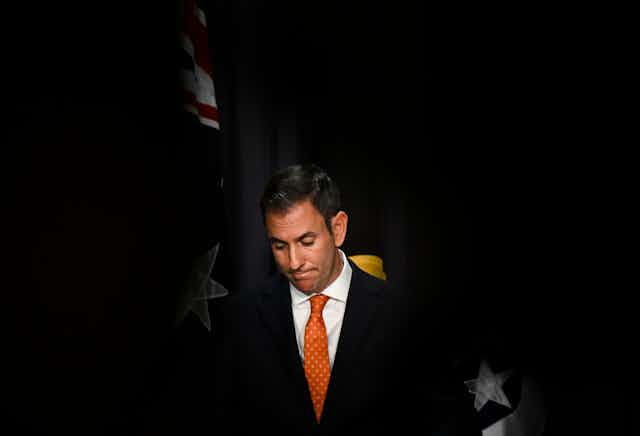Headwinds buffeting the economy – notably high inflation and a global slowdown – have led to a significant downgrade of Australia’s economic growth forecasts, compared with the pre-election estimates.
Treasurer Jim Chalmers will tell parliament on Thursday that estimated growth has been cut by half a percentage point for last financial year, this financial year and next year.
It is now expected that real GDP grew by 3.75% in 2021-22, rather than the pre-election forecast of 4.25%.
The growth forecast for 2022-23 is now 3%, down from 3.5%. Growth is expected to slow further in 2023-24, down from the earlier projected 2.5% to 2%.
The gloomy outlook on growth follows Wednesday’s news that inflation in the year to June was 6.1%, slightly lower than market expectations but a big jump on the 5.1% in the year to March.
As the cost of living surges, next week is set to see another hike in interest rates, the fourth in a row.
At his news conference after the release of the inflation numbers, Chalmers said he expected real wage growth “in this term of the parliament” but made it clear it would not occur any time soon.
He said that “a lot of people are living pay cheque to pay cheque for whom this inflation will be devastating because it’s getting harder and harder for them to substitute things out of their household budgets”.
He spoke to people widely and what he heard “again and again and again is that maybe in the first instance people started winding back on discretionary items - Netflix or something like that, we saw that in Netflix’s numbers - but it comes to a point when people are trying to work out what’s left to substitute out?
"I think that’s the practical demonstration of what’s happening here. Because at some point, the most vulnerable people are making decisions between vegetables or rent. And that’s when it really bites.”
In his Thursday economic statement, which he has said will be “confronting”, Chalmers will say: “Australia is outperforming much of the world, but that doesn’t make it easier to pay the bills at home.
"Our high inflation is primarily but not exclusively global. It will subside but not overnight.
"It’s been turbocharged by a decade of domestic failures on skills, on energy and on supply chains which just aren’t resilient enough.”
With inflation set to go higher before falling – the Reserve Bank predicts 7% by the end of the year – Chalmers will stress that the primary cause is certainly not higher wages. “We don’t have an inflation problem because workers are earning too much.”
Chalmers will say the revised forecasts reflect the economic circumstances the government is facing better than the pre-election forecasts.
Just as inflation will take some time to come down. so the domestic supply side pressures take some time to dissipate, he will say.
“In the meantime, higher interest rates, combined with the global slowdown […] will impact on Australia’s economic growth.”
But “the growing pressures on the economy and the country don’t make our election commitments less important – they make them far more crucial”.
The new parliament’s first question time on Wednesday was a relatively low key clash. The opposition focused its attack on the government’s dismantling of the Australian Building and Construction Commission. The government had ministers outline their plans in response to a series of “dorothy dix” questions from Labor backbenchers.

